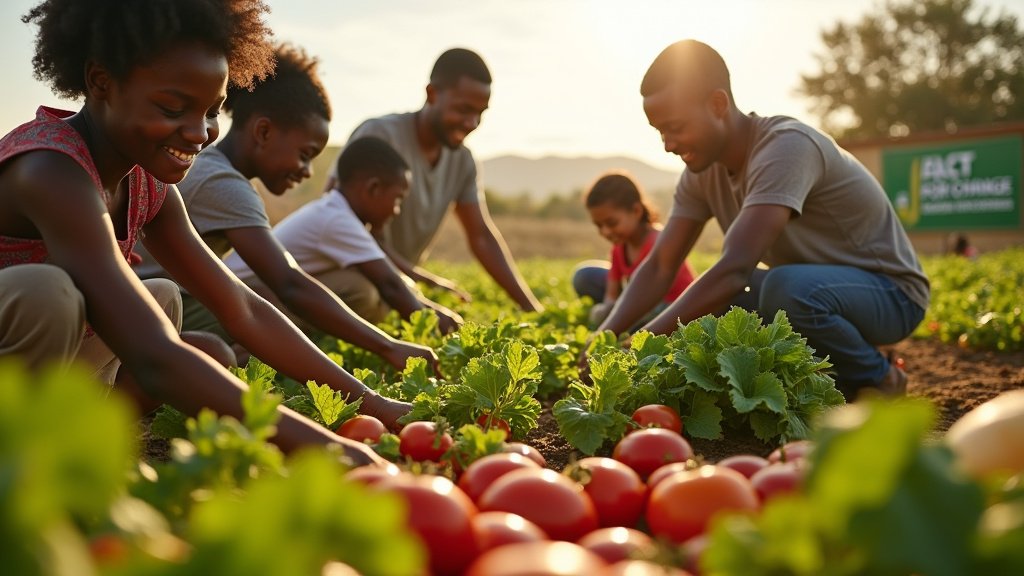South Africa’s ongoing battle with food insecurity is being met with a robust, community-driven response, spearheaded by a significant initiative from retail giant Shoprite. The company has launched its inaugural Act For Change Food Garden Competition, a nationwide R1 million investment aimed at recognizing and bolstering the efforts of individuals and communities transforming local landscapes into sources of fresh produce and hope. This initiative highlights the importance of Shoprite Food Gardens.
The Growing Challenge of Food Insecurity
Despite some reported improvements, food security remains a critical issue across South Africa. The South African Food Security Index 2025 indicates an increase in its score, yet millions of households continue to struggle with accessing sufficient and nutritious food. Statistics from the Human Sciences Research Council reveal that over 60% of households experience some level of food insecurity, with a significant portion unable to afford essential nutritious items. Factors such as high unemployment rates, rising living costs, and economic constraints exacerbate this challenge, making localised food production more vital than ever. The situation is particularly stark, with many households relying on nutrient-poor foods and facing hunger. Many community food gardens are working to combat this.
Shoprite Food Gardens: A Long-Standing Commitment
This competition is not an isolated effort but a continuation of Shoprite’s decade-long dedication to tackling food security at the grassroots level. Through its Act For Change programme, the retailer has supported nearly 300 community food gardens across South Africa, collectively producing over 106,000 kilograms of fresh produce in the past year alone. These Shoprite Food Gardens, ranging from urban rooftops to rural plots, play a crucial role in building community resilience, enhancing access to nutritious food, and fostering economic self-sufficiency and skills development. Shoprite’s support for Shoprite Food Gardens extends beyond financial aid to include practical interventions such as providing garden kits, training, tools, and resources through initiatives like its ‘Grow Your Own’ project. The impact of Shoprite Food Gardens is significant.
The Act For Change Food Garden Competition: Cultivating Impact for Shoprite Food Gardens
The newly launched Act For Change Food Garden Competition is designed to amplify the impact of these vital community projects. With a total prize pool of R1 million allocated as tailored support for winning gardens, the initiative seeks to strengthen their capacity and reach. The competition aims to celebrate people who are making a huge difference in their field or interest through dedicated gardening efforts, particularly those involved with Shoprite Food Gardens.
Six prizes will be awarded, offering substantial resources to boost productivity and sustainability for Shoprite Food Gardens. The breakdown includes:
* First place: Support valued at R225,000
* Second place: Support valued at R200,000
* Third place: Support valued at R170,000
* Fourth place: Support valued at R150,000
* Fifth place: Support valued at R130,000
* Sixth place: Support valued at R120,000
This support can be specifically directed towards a garden’s unique needs, such as irrigation systems, fencing, shade netting, or essential member training. The competition is open to all community-based food gardens across South Africa, whether independently managed or supported by other local organizations. However, private home gardens, companies, and close corporations are not eligible to enter. Emphasis is placed on community food gardens that align with the spirit of Shoprite Food Gardens.
Stories of Transformation and Hope
These community gardens are more than just plots of land; they are vibrant hubs where people grow friendships, develop agricultural skills, and cultivate dignity. Stories abound of ordinary people doing extraordinary things. For instance, the Neighbourhood Old Age Homes (NOAH) garden in Khayelitsha provides fresh produce and serves as a cherished social space for elderly residents, fostering a sense of belonging. In Mpumalanga, Nomxoliswa Makhabane transformed a lockdown garden into Ekuqaleni Genesis Farm, feeding over 150 people and creating a livelihood. These are precisely the kinds of stories the Act For Change competition seeks to highlight—real people driving real change, one seedling at a time, embodying the ethos of Shoprite Food Gardens.
How to Participate in the Shoprite Food Gardens Initiative
Community gardens interested in entering must be represented by individuals over 18 years old. Entries require a concise description detailing the garden’s history, purpose, and community impact, accompanied by photographic evidence of the project. The deadline for submissions is November 30, 2025, with winners scheduled to be announced by April 30, 2026. Interested parties can find more details and enter online at www.actforchangefoodgardencompetition.datafree.co, learning more about how to contribute to Shoprite Food Gardens.
Planting a Sustainable Future with Shoprite Food Gardens
Shoprite’s investment in community food gardens aligns with its broader sustainability agenda, which includes significant efforts in reducing food waste, donating surplus food, and promoting responsible consumption. By championing these grassroots initiatives, Shoprite is not only addressing immediate food access challenges, including food insecurity South Africa, but also nurturing long-term community resilience, skills development, and social cohesion. This R1 million competition represents a significant step in empowering South Africans to cultivate their own futures and foster a more food-secure nation through initiatives like Shoprite Food Gardens, supporting local food production and sustainable agriculture.





